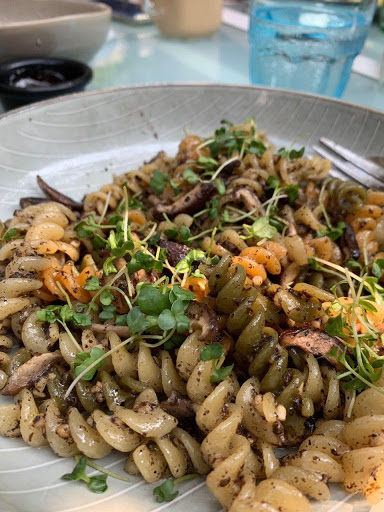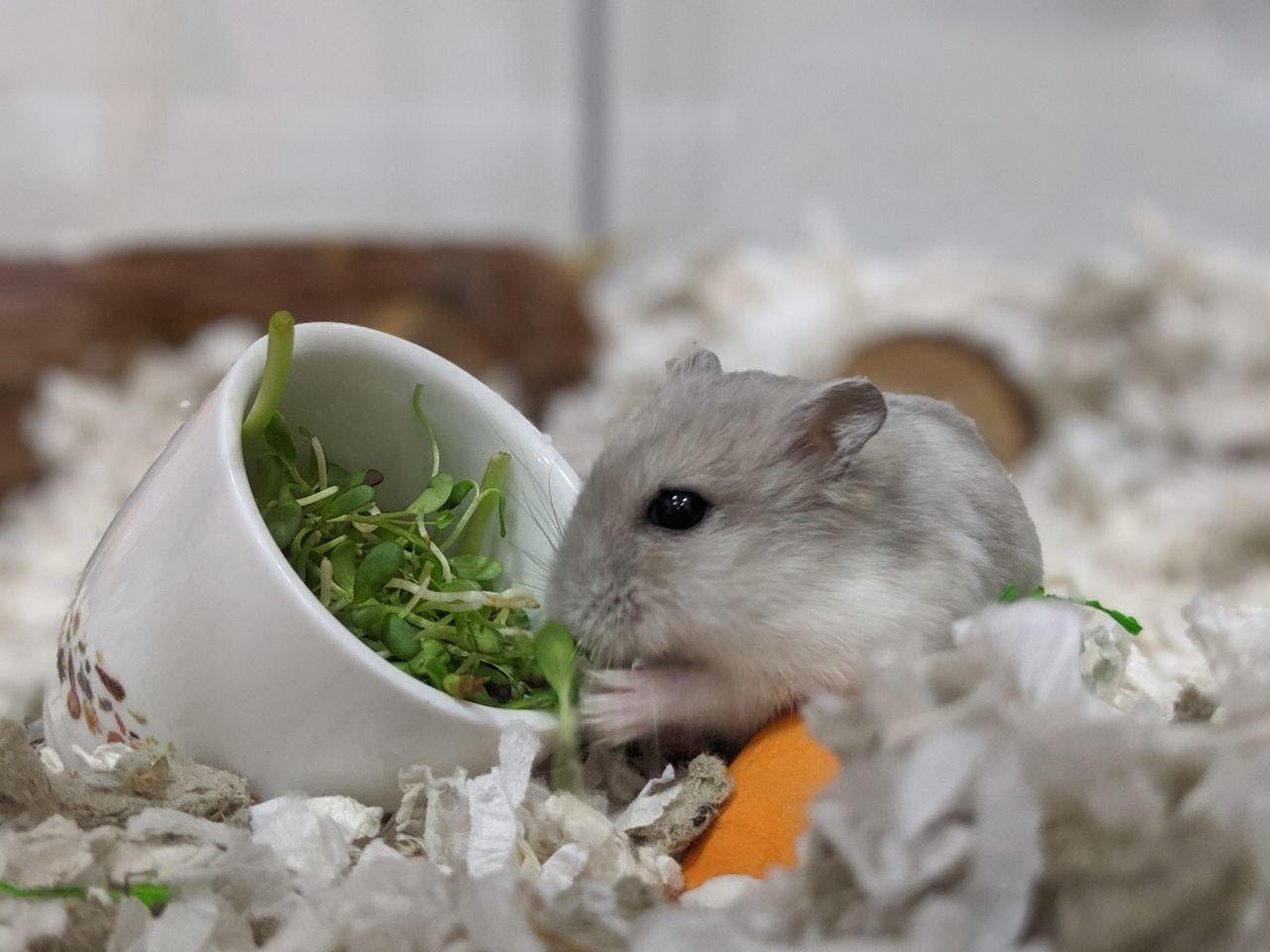Enter The Urban Farmer
It is not a career that many young people think about but Clement Teo shares with Frederick Law that farming is an alluring option.
BY
FREDERICK LAW
Published on
July 27, 2020

Pasta garnished with vegetables from Two Leaf. Photo courtesy of Clement Teo.
Clement Teo, 25, co-founded StygianForce, a mobile gaming accessory brand, in 2017. However, after two years of “basically being the marketing, accounting, logistics, design and social media guy”, he felt burnt out. He left the company in 2019 “in search of a break”, and spent the next two months “mainly fishing and thinking about [his] next step”.
It was during this break in Jun 2019 when a close friend sent him a link to an article about urban farming. That was the turning point – he decided to pursue farming.
Clement said over our phone interview: “It was like a breath of fresh air. I thought, hey, this could actually be a good business idea.”
The Mass Communication graduate (Class of 2017) from Ngee Ann Polytechnic’s School of Film & Media Studies never imagined that he would be plying his trade in farming.
“I wanted to be a radio DJ when I graduated. I never thought I would zong cai (grow vegetables) and become a farmer,” said Clement, the owner of Two Leaf, a small urban farm business that is operating out of his parents’ condominium in Pasir Ris.
He set about learning as much as he could about urban farming through videos and various online resources, and promptly ordered a ‘microgreen starter kit’ from Taobao which consisted of a few plastic trays and prepackaged xiao bai cai (Chinese white cabbage) seeds.
He laughed as he said: “Of course, my first crop failed.”
Microgreens are vegetables that are harvested early when their first set of leaves develop. A 2012 study by the University of Maryland found that the majority of vegetables harvested as microgreens contained up to six times more nutrients than vegetables that were harvested at maturity.
He added that microgreens are becoming more popular not only because of the health benefits but “the variety of interesting colours, flavours and textures” that they add to a meal. Microgreens also cost more than traditional vegetables – ranging from S$8 to S$20 for 100 grams of produce.
Not satisfied with the quality of the information he found online, he set out to volunteer at local farm Edible Garden City, one of the pioneers of sustainable urban farming. His voluntary stint with Edible Garden City in mid-2019 opened his eyes to how modern farms operate and gave him “a sense of the scalability” and potential of his own operation.
Edible Garden City produces 600 to 1,000 kilograms of microgreens annually, which supplies over 30 local restaurants. Clement noted that “their grow space for microgreens is only about 50 square metres, which is basically the size of my parents’ balcony.”
His father, Anthony Teo, 49, who works as a network engineer, occasionally helps him out with Two Leaf’s operations. His father has been tending his own plot of ornamental plants for years in a small garden just outside their balcony, boasting an eclectic collection of orchids, sunflowers, and fruit trees.
“I’m glad that he has this new interest. I grew up in a kampong (village), and I was always surrounded by nature. Back [in the 1980s], we grew our own vegetables and if we wanted to eat [meat], we had pigs and chickens just outside our house. I never thought we would be able to grow vegetables in such a small space here,” the senior Mr Teo said.

Two Leaf’s grow space. Photo courtesy of Clement Teo.
By the end of 2019, he had expanded his small growing space to accommodate up to 18 trays for hydroponically-grown vegetables. He also started experimenting with aquaponics, retrofitting two plastic tubs by drilling holes and adding piping to connect them to his father’s aquariums.
Another covered plastic tub houses a few hundred earthworms, which possess the capability to decompose his entire household’s food waste. His most recent addition to his small arsenal of agricultural devices was a dehydrator to preserve excess harvested crops for future consumption.
Clement added: “Nothing goes to waste.” His small farm runs on a ‘closed-loop system’, a farming practice that recycles organic matter. When his father changes the water in his aquariums, the wastewater is used to water the crops. In turn, any uneaten or rotten vegetables are put into the bin of earthworms to be decomposed into a nutrient-rich fertiliser. This fertiliser is then used for his next batch of vegetables, or to fertilise his father’s ornamental plants.
Clement commented: “Although I approached this from a business point of view, learning and putting into practice this system has really broadened my perspective on sustainable and environmentally friendly ways of living.”
Today, on Clement’s farm, he can produce up to eight kilograms of microgreens and leafy vegetables a month – more than enough for his family’s nutritional needs. He sells or gives away any excess harvest to friends and family.
He estimates the cost of running his farm to be “about S$100 a month” in utility bills. He explained: “Once you set everything up, all you need to account for at this scale is the purchase of seeds, and water and electricity bills.”
He has grown micro basil, purple basil, pea tendrils, red amaranth, beetroot, micro arugula, mizuna, red vein sorrel, radish, alfalfa, sunflower, and broccoli microgreens thus far, with plans to test and grow many more types of microgreens.
He said: “Every microgreen thrives in different conditions – some need lower temperatures, and even the spectrum of light used to grow them will affect their taste and growth.”
Gladys Lam, 26, is another one of his customers; though she does not order the vegetables for herself. Instead, her hamster, whom she affectionately calls Peppy, is the one enjoying the greens. Ms Lam professed that she is “very picky when it comes to [her] hamster’s diet. [She] only chooses foods that have specific nutrition”.

Peppy the hamster nibbling on some alfalfa. Photo courtesy of Gladys Lam.
Although Peppy could not comment, Ms Lam said that her “hamsters absolutely loved [the vegetables]”. She added: “Peppy’s favourites are the broccoli and alfalfa microgreens.”
Clement is already planning an expansion to a bigger space to be able to supply vegetables to restaurants and cafes, although he confessed that “it is really not easy to find suitable premises within my budget”.
Despite starting Two Leaf with “only a few thousand dollars”, he is still not making any real profit from his farm yet. He said: “I’m young, and I am lucky to have opportunities provided by my parents to support me in what I would like to achieve. I enjoy exploring business opportunities and thinking out of the box to solve problems. In a way, business is finding a solution for a problem in the world. That is why I believe in Two Leaf.”
In a way, business is finding a solution for a problem in the world. That is why I believe in Two Leaf.

Your article made me suddenly realize that I am writing a thesis on gate.io. After reading your article, I have a different way of thinking, thank you. However, I still have some doubts, can you help me? Thanks.
I don’t think the title of your article matches the content lol. Just kidding, mainly because I had some doubts after reading the article. https://www.binance.com/pt-PT/register?ref=GJY4VW8W
The point of view of your article has taught me a lot, and I already know how to improve the paper on gate.oi, thank you. https://www.gate.io/zh-tw/signup/XwNAU
Thanks for sharing. I read many of your blog posts, cool, your blog is very good. https://accounts.binance.com/sl/register?ref=YY80CKRN
The point of view of your article has taught me a lot, and I already know how to improve the paper on gate.oi, thank you.
yoga music
Can you be more specific about the content of your article? After reading it, I still have some doubts. Hope you can help me.